Iranian MP Says Criteria for Islam 'Includes Fighting US, Israel'
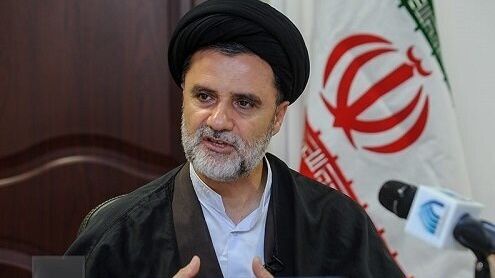
Tehran representative Mahmoud Nabavian has claimed true Islam includes fighting Iran's archenemies, the US and Israel.

Tehran representative Mahmoud Nabavian has claimed true Islam includes fighting Iran's archenemies, the US and Israel.
"The criterion for being a Muslim is, first and foremost, fighting against America and Israel," Nabavian declared. As Iran continues its decades-long proxy war against the Jewish state, he said the Iranian revolution is meaningless without opposing Israel, citing the incorporation of the principles in the Iranian Constitution and parliamentary laws.
Iran has long employed an anti-US and anti-Israel propaganda strategy as a central pillar of its ideological and foreign policy agenda. The narrative is perpetuated through state-controlled media, educational curricula, and political rhetoric, consistently framing the United States and Israel as principal adversaries.
This messaging is not only aimed at bolstering domestic support by uniting the population against external "enemies," but also at extending Tehran's influence across the Middle East, Iran having given birth to a host of militant groups across the region such as the Houthis in Yemen and Hezbollah in Lebanon, supporting others such as Hamas in Gaza.
Amid the ongoing war in Gaza, fueled by Hamas's October 7 invasion of Israel, Iran's proxies have all launched allied attacks on both US targets for having supported Israel's right to defend itself as well as Israel, from Syria, Yemen, Lebanon, Iraq and Gaza.
Last month saw the first direct attack on Israel from Iran when over 350 missiles and drones were launched towards Israel, mostly intercepted by Israel and a US-led coalition force as the tit-for-tat shadow war between the two states was drawn out into the open.
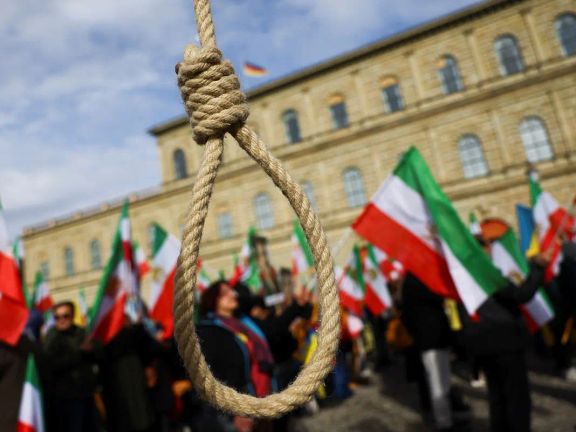
Iran is at the forefront of a surge in recorded executions in 2023, as revealed by the latest report from Amnesty International.
“In Iran, the authorities intensified their use of the death penalty to instill fear in the population and tighten their grip on power, carrying out executions across the country,” said Agnès Callamard, Amnesty International’s Secretary General.
A total of 1,153 executions were recorded last year, with Iran responsible for 74% of these executions and Saudi Arabia for 15%.
“The huge spike in recorded executions was primarily down to Iran,” said Callamard.
Currently, in Iran there are at least dozens of dissidents at threat of imminent execution. That includes prominent rap artist Toomaj Salehi.
At least seven other dissidents, Amnesty said last week, are awaiting execution following their involvement in the "Woman Life Freedom" uprising in Iran.
Among them are Fazel Bahramian, Mahmoud Mehrabi, Mamousta Mohammad Khazrnejad, Manouchehr Mehman Navaz, Mehran Bahramian, Mojahed (Abbas) Kourkouri, Reza (Gholamreza) Rasaei.
The recorded executions in Iran disproportionately targeted Iran's Baluchi ethnic minority, making up 20% of recorded executions despite representing only about 5% of Iran's population.
Additionally in Iran, at least 24 women and five individuals who were minors at the time of the crime were executed.
Surge in Drug-Related Executions Continues
More than half of Iran’s recorded executions were unlawfully carried out for acts that should not result in the death penalty under international law, including drug-related offenses, robbery and espionage, the report said.
Amnesty has called this a "distressing return to a lethal anti-narcotics policy since Ebrahim Raisi’s rise to presidency in 2021."
Execution for drug-related offenses surged and constituted 56% of recorded executions in 2023, an increase of 89% from 255 executions recorded in 2022.
“The Iranian authorities showed complete disregard for human life and ramped up executions for drug-related offenses, further highlighting the discriminatory impact of the death penalty on Iran’s most marginalized and impoverished communities,” Calamard noted.
Iran’s escalating executions since the 2022 uprising
This year, the organization's report titled "Don't Let Them Kill Us", called for urgent international intervention to halt the surge in executions, which it describes as transforming Iranian prisons into grounds for mass executions.
In January, Deputy US Special Envoy for Iran Abram Paley said that the death penalties in Iran were often imposed following "sham trials against defendants who lacked adequate legal counsel."
Following the nationwide protests in Iran in 2022, Amnesty says, Iranian authorities have committed numerous violations of international law in a bit to stifle dissent.
These include hundreds of unlawful killings, arbitrary execution of seven protesters, tens of thousands of arbitrary arrests, widespread torture (including rape of detainees), extensive harassment of victims' families advocating for truth and justice, and reprisals against women and girls challenging discriminatory compulsory veiling laws.
The number of people executed in Iran marks a 48% rise from 576 in 2022.
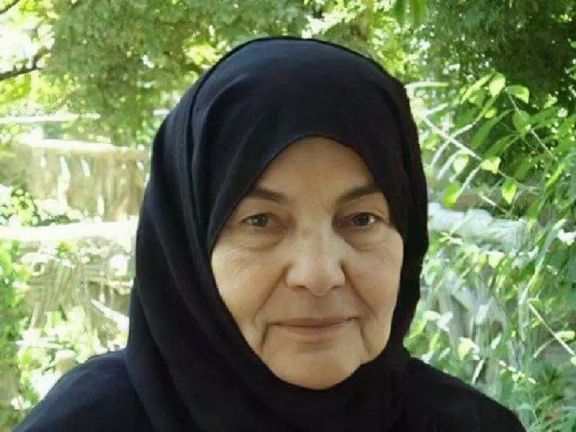
Iranian Supreme Leader Ali Khamenei's office is organizing a memorial service in the religious city of Qom for Nahdia Hashem Safi Al-Din, the mother of Hassan Nasrallah, the Secretary General of Hezbollah.
Safi Al-Din, who had nine children, is related to prominent figures within Iran's militant networks. Her cousin is the father-in-law of Zainab, the daughter of the late Qassem Soleimani, the former commander of the IRGC Quds Force.
Nasrallah did not attend his mother's funeral south of Beirut on Monday due to security concerns and the need to avoid exposure. Instead, his close associate and potential successor, Hashem Safi al-Din, who is the Chairman of the Hezbollah Executive Council, was present.
Iran's support for Hezbollah, its biggest and most powerful proxy, has been a key element of its foreign policy and regional strategy since the group's inception in the early 1980s. Tehran provides Hezbollah with extensive financial aid, estimated at hundreds of millions of dollars annually, in addition to advanced military equipment and training.
The backing has transformed Hezbollah from a local militia into a formidable political and military entity in Lebanon, significantly influencing the country's political landscape and security situation.
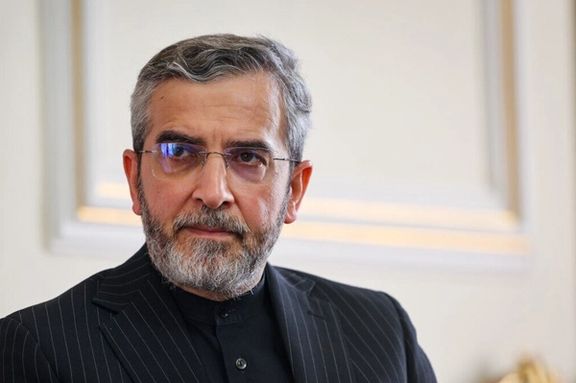
Ali Bagheri Kani, Iran's acting Foreign Minister, denied reports that the nuclear file had been handed over to Ali Shamkhani, an advisor to the Iranian leader.
"We have no such thing as a file in the nuclear discussion. Nuclear activities continue within the framework of the system's policies under the supervision of the Supreme National Security Council," Bagheri Kani stated.
The acting foreign minister emphasized that nuclear activities are managed under the Supreme National Security Council, despite unofficial reports suggesting Shamkhani took over the management of the nuclear file.
Shamkhani, who oversaw nuclear talks during former President Hassan Rouhani's tenure, served as Secretary General of the Supreme National Security Council for a decade.
On Monday, Foreign Ministry spokesman Nasser Kanaani responded ambiguously to questions about Shamkhani’s alleged new role, saying, "I have no specific comment on this matter." His vague response has been interpreted by many domestic media outlets as a tacit confirmation of the reports.
Bagheri Kani also addressed journalists about the ongoing indirect negotiations and message exchanges between Iran and the United States, stating, "Message exchanges continue as before, and there has been no interruption in the process."
Reports of Ali Shamkhani's appointment come in the wake of an Axios news article revealing that indirect negotiations took place on May 18 between Iranian and US officials in Muscat. According to informed sources quoted by Axios, this round of talks was the first since January and included Brett McGurk, advisor to the US President for Middle East affairs, and Abram Paley, the US special envoy to Iran.
The website did not disclose the identities of the Iranian officials involved in the discussions, which focused on addressing US concerns about the status of Iran's nuclear program.
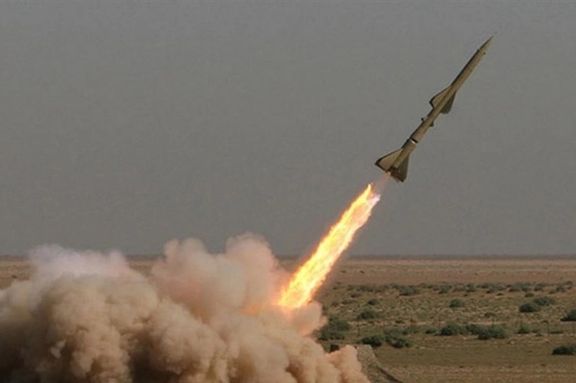
Tasnim News Agency, affiliated with Iran's Revolutionary Guard (IRGC), reported on Wednesday that Iran has supplied the Houthi rebels in Yemen with the Ghadr ballistic missile.
The missile, described as the first Iranian anti-ship ballistic missile, is now in the hands of Yemeni fighters, enhancing their capability to target maritime vessels.
The revelation is significant as it confirms that Tehran has been arming its proxy forces in Yemen with advanced ballistic missiles.
This follows a pattern of Iran's military support to its allies in the region, further destabilizing the Middle East.
Tasnim's report also highlighted the history of the anti-ship ballistic missile's development, pointing out that Iran needs to be able to threaten US and other foreign navies in the broader Middle East.
In March, UK Defense Secretary Grant Shapps accused Iran of supplying ballistic missiles to Russia for use in Ukraine, highlighting Tehran's expanding role in global conflicts.
Since November, the Houthis have been using Iranian-supplied missiles and drones to attack commercial ships in the Red Sea, a critical global trade route. The attacks were initially a response to the Israeli military offensive in Gaza but have since severely disrupted maritime trade in the region.
The Houthi campaign in the Red Sea began after Iran's Supreme Leader Ali Khamenei called on Muslim nations to blockade Israeli trade.
Despite US and British military strikes on Houthi targets starting in January aimed at degrading their arsenal, the group’s attacks have continued.
The situation has been exacerbated by the expiration of UN Security Council restrictions on Iran's export of certain missiles, drones, and related technologies in October. However, the United States and European Union have maintained sanctions on Iran's ballistic missile program, citing persistent concerns over the proliferation of Iranian weaponry to proxies in the Middle East and to Russia.
This ongoing transfer of advanced military technology to the Houthis underscores the Iranian regime's commitment to extending its influence and military capabilities through proxy warfare, posing a significant threat to regional and global stability.
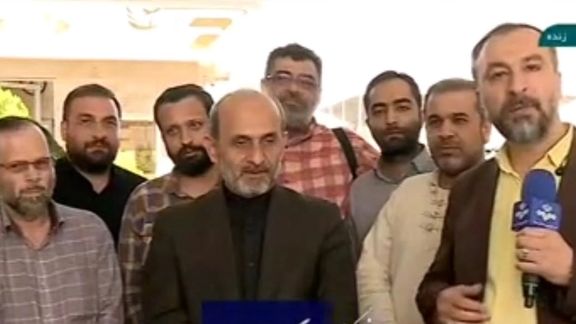
In a move against Iran’s attempts to politicize religious pilgrimages, Saudi Arabia has expelled six members of a media group linked to the office of Iran's Supreme Leader Ali Khamenei.
This follows Khamenei's recent emphasis on encouraging political activities among pilgrims during this year's Hajj, raising concerns about the Islamic Republic's efforts to spread its propaganda.
Iranian media reported that the individuals were detained while filming a program in Al-Masjid an-Nabawi, a holy site in Saudi Arabia where political activities are strictly prohibited. They were dispatched by an office controlled by Khamenei that deals with Hajj affairs.
The group were detained in Saudi Arabia for a week before being released and sent back to Iran, according to Iranian media reports.
The group, which includes former director of IRGC-linked Ofogh TV Salim Ghafouri, Shafi' Sho'lekar, Mehdi Mo'ayedi, Mehdi Amiri, Pouria Soleimanzadeh, and Alireza Taban, were reportedly sent to Dubai on Tuesday evening and arrived in Iran the following day.
The head of the Islamic Republic of Iran Broadcasting (IRIB) personally welcomed the team at Tehran’s airport and confirmed that the six members were sent back to Iran following the intervention of Saudi authorities.
Jebelli said he was unaware of the reason for the arrests, but noted that the group had been expelled from Saudi Arabia without performing the Hajj pilgrimage.
He also stated that Iranian authorities, including the Ministry of Foreign Affairs, the Supreme Leader's Representative for Hajj Affairs, and the Iranian Embassy in Saudi Arabia, had been following up on the matter.
He emphasized that Iranian media personnel are regularly sent to perform the Hajj pilgrimage legally and that this incident was unprecedented.
In November, Saudi Arabia temporarily barred Iranian propagandist Ali-Akbar Raefipour from leaving the country as he tried to return to Iran after Hajj pilgrimage. Hardliner Raefipour who promotes apocalyptic views based on Shiite eschatology and the coming of promised savior Mahdi is known for his conspiracy theories.
According to IRIB News, Saudi police also arrested two more Iranian journalists, one from Al-Alam News Network and the other from IRIB News Agency, two days after detaining the first group.
The journalists were reportedly arrested "without cause" as they were getting out of their car to attend a Du'a' Kumayl ceremony, a mainly Shiite supplication, at the Iranian pilgrims' hotel.
IRIB did not provide any information on the whereabouts or condition of the two detained journalists.
Also on Wednesday, Tasnim News Agency, affiliated with the Revolutionary Guards, reported that other Iranian journalists reporting on the Hajj pilgrimage remain in Saudi Arabia and have not faced any issues.
Iran has traditionally tried to politicize the hajj pilgrimage by organizing marches, chanting and demonstrations by pilgrims.
Earlier in May, Supreme Leader Ali Khamenei delivered yet another anti-US and anti-Israeli speech, implicitly also attacking Saudi Arabia, saying that "Anyone who extends a hand of friendship to America and Israel is an oppressor."
The May 6 speech that was meant to be a guide for Iranians planning to go to Hajj pilgrimage turned out to be mainly about regional issues linked to the possible rapprochement between Saudi Arabia and Israel.
Referring to a term coined by his predecessor Ruhollah Khomeini, "Distancing from the infidels," which strained ties between Iran and Saudi Arabia and resulted in the death and injury of tens of pilgrims due to the chaos caused by Iranian government agents in Mecca during the Haj pilgrimage in 1987, Khamenei described this year's Haj agenda for Iranian pilgrims as "distancing from the criminal Zionist enemy and its supporters."
This marked a return to the hostile rhetoric that was softened by Khamenei when Iran resumed its ties with Saudi Arabia in early 2023 after seven years, in a China brokered deal between the two countries.